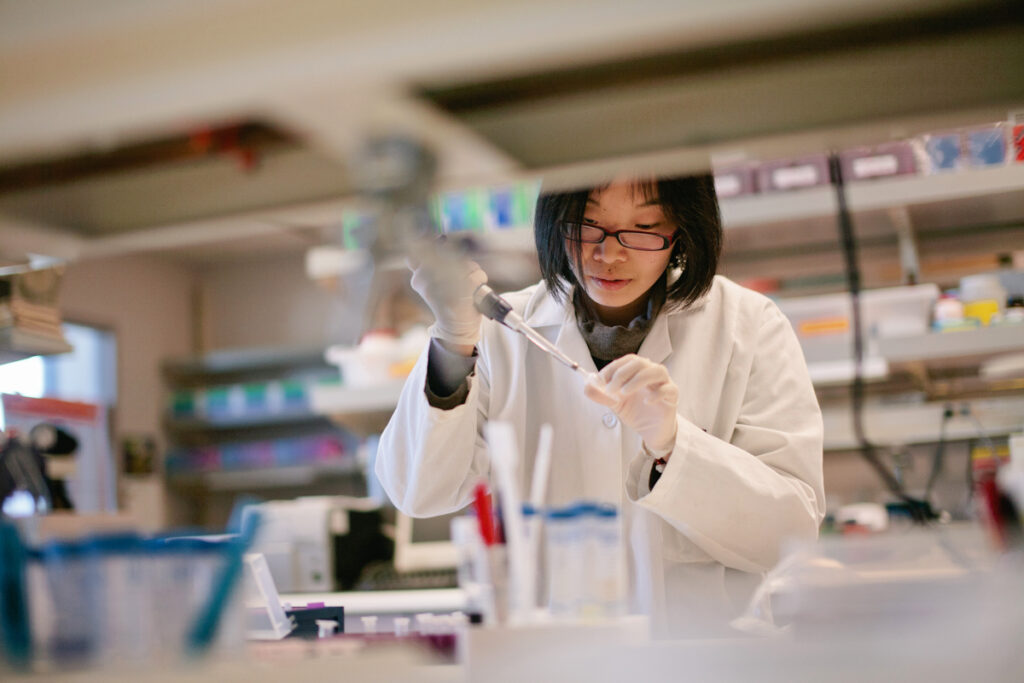Thrush is a disease caused by opportunistic fungi Candida albicans (C. albicans). Usually, C. albicans is present in the vagina in small amounts and does not cause disease. However, when immunity is reduced, or the microflora is disturbed, C. albicans multiply excessively, causing symptoms of thrush:
- itching, soreness, and irritation of the vulva;
- pain or discomfort during sex or urination;
- vaginal discharge, often white curdled;
- vulvovaginal inflammation, redness of the vagina and vulva.
Thrush affects 75% of women of reproductive age. Thrush is also called vulvovaginal candidiasis. Candida albicans cause 85-90% of cases of vulvovaginal candidiasis. When overgrown, C. albicans disrupt the mucosal barrier, resulting in cell damage.
Three main drugs treat thrush: polyenes, azoles, and echinocandins. However, some strains of C. albicans are resistant to antifungal drugs. This problem poses a vital task for scientists – to find new methods of treatment and prevention of fungal diseases.
Interferon-Alpha-2b is Essential for Antifungal Immunity
Interferons (IFN) are molecules that trigger an immune response against infectious agents. Italian scientists have found that Candida spp. and Saccharomyces cerevisiae induce a protective interferon-beta reaction in the body. In addition, after intravenous administration of Candida albicans to mice, most of the mice lacking the IFN-alpha/beta receptor died from uncontrolled fungal growth. However, mice with a regular interferon system survived.
Chinese scientists have shown that interferon-alpha-2b is necessary for antifungal immunity, inhibits the reproduction and growth of C. albicans fungi, and accelerates the recovery of vaginal epithelial cells:
- IFN-alpha-2b enhances local vaginal cellular immunity before infection, stimulating a rapid response to C. albicans and providing enhanced protection for the vaginal epithelium. IFN-alpha-2b enhances the production of interleukins IL-2, IL-4, and IL-17. IL-2 stimulates the proliferation and activation of T cells and activates natural killer cells and B cells. IL-4 stimulates the proliferation of activated B-cells and T-cells, promoting inflammation reduction and tissue healing. IL-17 also promotes the production of antimicrobial peptides and protects against oral and mucocutaneous candidiasis.
- IFN-alpha-2b promotes the T-helper response 17. These cells support mucous membranes and protect against fungal and bacterial infections.
- IFN-alpha-2b stimulates the secretion of non-B-cell IgG antibodies. The classical concept of antibody production suggests that only B cells secrete IgG. However, healthy vaginal epithelial cells can also secrete functional IgG antibodies. This form of IgG is involved in the innate vaginal immune response against fungal infections, similar to traditional IgG expressed by B cells.
Interferon-Alpha-2b in Thrush Treatment
Chinese scientists investigated the effectiveness of recombinant interferon-alpha-2b for the treatment of thrush. The study was carried out on rats.
The rats were divided into 4 groups:
- Group 1 – control: healthy rats.
- Group 2 – model: rats with vulvovaginal candidiasis, without treatment.
- Group 3 – rats with vulvovaginal candidiasis treated with IFN-alpha-2b once daily at a dosage of 1.25 mg/ml.
- Group 4 – rats with vulvovaginal candidiasis, treatment with vaginal effervescent tablets containing nystatin, 2 times a day, 104 IU/ml. Nystatin is an antifungal drug from the group of polyenes.
For rats, IFN-alpha-2b at 1.25 mg/ml per day is a safe dose with few toxic side effects and the highest concentration at which interferon does not affect cell viability (90% survival) but exhibits 10% cytotoxicity.
Four days after the 7-day treatment period, the scientists calculated the vaginal fungal load and the degree of damage to the tissues of the vagina.
Interferon-Alpha-2b Suppresses Candida Albicans in Thrush
IFN-alpha-2b reduced vaginal fungal load by 54% compared to a group of sick rats without treatment.
IFN-alpha-2b inhibited fungal growth by 50%. Compared to interferon, nystatin inhibited fungal growth by 100%.
Interferon-alpha-2b Reduces Inflammation and Maintains the Integrity of Vaginal Tissues
In rats with candidiasis and not undergoing treatment, the vaginal mucosa was severely damaged. Neutrophilic infiltration and microabcesses were observed in the mucous membrane.
IFN-alpha-2b reduced the degree of damage to the tissues of the vagina and restored the thickness of the epithelium. Although this effect was not statistically significant, it was significantly more potent than in the nystatin group.
Interferon-Alpha-2b Enhances The Immune Response Against Candidiasis
C. albicans infection triggers an antifungal T-helper cell type 1 (Th1) response. In addition to reducing inflammation and tissue damage, IFN-alpha-2b stimulated the Th1 immune response.
In addition, IFN-alpha-2b significantly increased the level of IFN-gamma in vaginal tissues. IFN-gamma plays a crucial role in epithelial cell signaling. These signals lead to the activation of phagocytes and the launch of a protective response of Th1 cells, which are involved in destroying fungal pathogens.
The introduction of IFN-alpha-2b significantly increased the levels of non-B-cell IgG antibodies in the mucosal epithelium compared with the group without treatment. There were no significant differences between the groups treated with interferon and nystatin.
Conclusions
IFN-alpha-2b inhibits the reproduction and growth of thrush fungi by 50%. Although interferon is inferior to the typical antifungal drug nystatin, which completely blocks the reproduction and development of fungi, IFN-alpha-2b can be used in the complex therapy of vulvovaginal candidiasis to improve the immune response.
Interferon-alpha-2b reduces vaginal inflammation and T-cell infiltration and promotes the restoration of the vaginal epithelium in case of Candida albicans infection. Damage to the epithelium is associated with reduced production of type I interferon. Therefore, the introduction of IFN-alpha-2b can accelerate the regeneration of the vaginal epithelium.
Treatment with interferon-alpha-2b enhances the production of IgG antibodies by vaginal epithelial cells. These non-B-cell IgGs are involved in the innate vaginal immune response against fungal infections, either by neutralizing the fungus directly or activating other immune cells that will destroy the fungus.
Type I interferon is required to activate antifungal immunity in vaginal epithelial cells. IFN-alpha-2b can be used to treat vulvovaginal candidiasis in parallel with antifungals to improve patient outcomes.
Useful article, necessary information? Share it!
Someone will also find it useful and necessary:
References
- Therapeutic effectiveness of type I interferon in vulvovaginal candidiasis | Microbial Pathogenesis
- Recombinant Human IFNα-2b Response Promotes Vaginal Epithelial Cells Defense against Candida albicans | Frontiers in Microbiology



